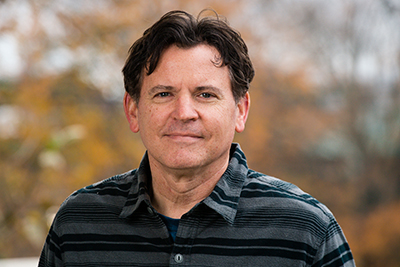Associate Professor
University Hall 5026
(205) 934-8593
Research and Teaching Interests: Early American Literature and culture, portrayals of addiction
Office Hours: By appointment
Education:
- B.A., University of Michigan, Biology/Minor in Chemistry
- M.A., Loyola University Chicago
- Ph.D., Loyola University Chicago
My area of specialization is early American literature and culture, which most college English departments define as roughly between 1620 and 1865. I became interested in this period of early American history because it gave rise to many of the beliefs, hopes, fears, and anxieties that still characterize America today. In my classes, I like to present the books we read as “in conversation” with other aspects of their cultural milieu such as art, law, medicine, advertising, and so on. I subscribe to the idea that literature is, as the philosopher Kenneth Burke put it, “equipment for living.” In other words, stories help people make sense of and navigate their worlds. My classes are designed to explore this process of “sense-making,” both in the texts of the past and in our culture today.
Most of my early research is about how early American writers engaged with the monumental economic changes that occurred in the years between the Revolution and the Civil War. More recently, though, I have been writing about the influence of medicine on early American literature and culture. As institutionalized medicine grew in power and prestige beginning in the late 1700s, medical professionals became increasingly concerned with patterns of behavior — behaviors associated with sex, alcohol, drugs, gambling, and religion — that they deemed excessive. Such behaviors ultimately came to be called “addictions,” and the afflicted patient became an “addict,” an abnormal person requiring institutional intervention. In my book manuscript, I explore this process of how addiction became a legitimate diagnosis, how and why some behaviors came to be labeled as addictions, and the cultural norms that developed as a result.
I am originally from the Chicago area, but have lived in Birmingham since 2001. My wife Cheryl, who I met in graduate school at Loyola, also teaches English at UAB. We have three children, a dog, and three cats. In my spare time I like to create art, watch the Cubs and Michigan football, and help raise my kids.
-
Recent Courses
- American Literature Before 1820
- The American Renaissance Reconsidered
- Literature, Medicine, and Science in Early America
-
Select Publications
Book Chapters
- Gale Temple, “Melville and the Gothic Romance,” in Critical Insights: Herman Melville, Eric Carl Link, ed. (Salem Press, 2013): 121-41.
- Gale Temple, “Masculine Ambivalence in The Scarlet Letter,” in Bloom’s Guides: Nathaniel Hawthorne’s The Scarlet Letter (Chelsea House Publications, 2012, reprint): 84-88.
- Gale Temple, “‘Ineffable Socialities’: Melville, Hawthorne, and Masculine Ambivalence in the Antebellum Marketplace,” in Hawthorne and Melville: Writing a Relationship, Jana Argersinger and Leland Person, eds. (University of Georgia Press, 2008): 113-31.
- Gale Temple, “Fluid Identity in Israel Potter and The Confidence-Man,” in A Companion to Herman Melville, Wyn Kelley, ed. (Blackwell Publishing, 2006): 451-66.
Articles
- Gale Temple, “‘Affrighted at the Eager Enjoyment’: Hawthorne, Nymphomania, and Medical Manhood,” Textual Practice 28 (No. 3, 2014).
- Gale Temple, “Israel Potter: Sketch Patriotism,” Leviathan: A Journal of Melville Studies 11 (No. 1, 2009): 3-18.
- Gale Temple, “Carwin the Onanist?” Arizona Quarterly 65 (No. 1, 2009): 1-32.
- Gale Temple, “His Delirious Solace: Consummation, Consumption, and Reform in Hawthorne’s Blithedale Romance,” ESQ: A Journal of the American Renaissance 49 (2003): 285-321.
- Gale Temple, “A Purchase on Goodness: Fanny Fern, Ruth Hall, and Fraught Individualism,” Studies in American Fiction 31 (2003): 131-63.
-
Academic Distinctions and Professional Societies
- Modern Language Association
- Nathaniel Hawthorne Society
- Charles Brockden Brown Society
- Herman Melville Society
- C19: The Society of Nineteenth-Century Americanists
